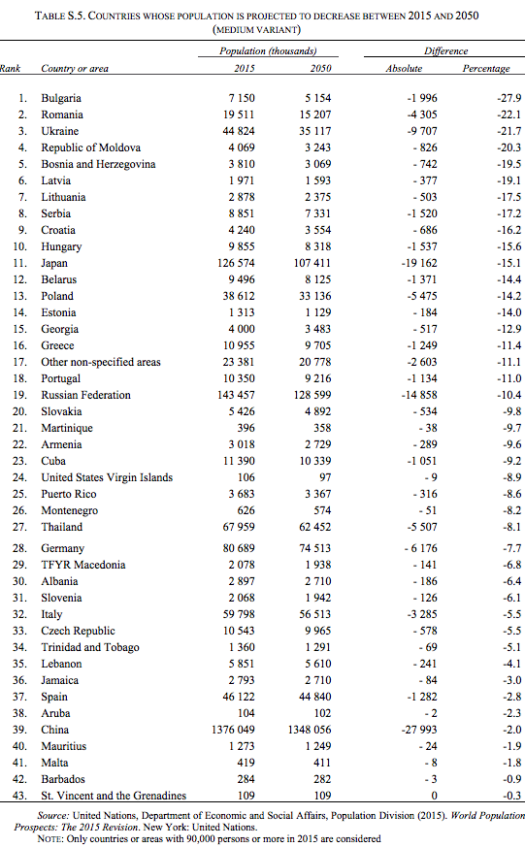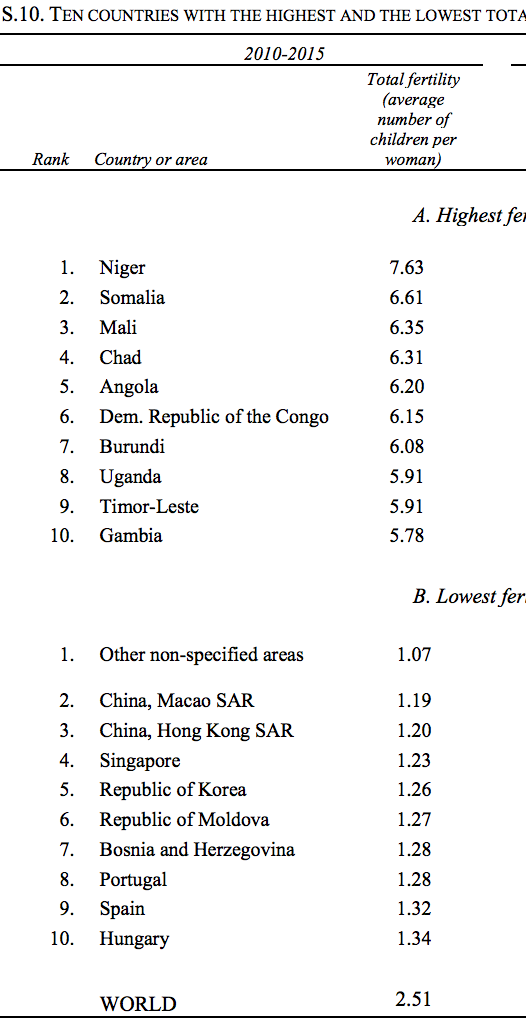The German demographic puzzle
Before getting into today’s post, a few notes:
1. Bad jobs report, no June rate rise. Low rates as far as the eye can see. What else is new?
2. I was interviewed by Cloud Yip of Hong Kong, and the entire interview is here. I apologize if some of my answers are a bit rambling, I am used to reporters just using one or two sentences from an interview, and didn’t expect the entire interview to be posted. In any case, it’s mostly about The Midas Paradox and my views on Keynesian economics.
Here’s a list of countries that the UN expects to lose population, between 2015 and 2050. Notice that the ten fastest declining countries are all in Eastern Europe:

Here’s something that surprises me even more. Every single Eastern Europe country is expected to lose population, including Armenia and Georgia, which aren’t technically in Europe, but are “culturally” European.
So what about Western Europe? Let’s leave aside Germany for the moment. The other Western European countries expected to lose population are Greece, Italy, Spain, Portugal and Malta. So if we go by Wikipedia’s definition of “Europe” (which oddly excludes Cyprus) every single Eastern and Southern European country is expected to lose population.

OK, so we all know about Europe’s bad demographics (or good, if you are a misanthrope.) But as we move away from Eastern and Southern Europe, only one country is expected to lose population—Germany.
Suppose you had seen population data for all the other countries in Western Europe, north of the Alps, and saw that every single one except Germany was expected to gain population. The UK is expected to gain over 10 million; France will gain over 6 million. Would you expect Germany to look more like Southern and Eastern Europe, or northwestern Europe? All the other Nordic countries gain. All the other German-speaking countries gain. All the other affluent countries gain. Housing is cheaper in Germany than the UK. All the characteristics that fit Germany point to gains, often large gains (as in Switzerland).
But Germany is expected to see its population plunge by more than 6 million. Why?
The only thing I could think of was eastern Germany, but that region is far too small to explain such a massive expected population decline.
It’s also kind of fun to look at the UN projections in other areas:
Iran 79.1 million (2015) 69.6 million (2100)
Iraq 36.4 million (2015) 163.9 million (2100)
And my favorite:
Japan/Russia combined 185.0 million (1950) 200.6 million (2100)
Niger 2.6 million (1950) 209.3 million (2100)
In 1950, Niger had less than 1/3 as many people as Belgium, by 2100 it will have more than Russia and Japan combined. Can we trust these predictions? Of course not, but a couple points. These forecasts are based on the assumption that Niger’s fertility rate, currently about 7.6 kids per mom, will fall to 2.5 in 2100. In recent years the UN has actually been increasing its 2100 forecast for Africa, as fertility is not dropping as fast as earlier anticipated. So this might just as well be an underestimate.
Here’s another way of looking at UN predictions. They forecast a growth in total world population of 2,712 million between 2030 and 2100. They forecast growth in Africa’s population of 2,708 million between 2030 and 2100–that’s two Chinas. Which means the UN thinks the world’s non-African population will basically not change at all between 2030 and 2100 (although they actually do see a rise from 2030 to 2050, then an equal decline from 2050 to 2100).
BTW, the UN projects that China’s population will fall to about a billion in 2100, but I believe that it will fall much faster. They forecast that Chinese fertility, which has been falling, will rise from 1.55 today to 1.81 in 2100, despite the fact that China is likely to be much richer in 2100, and despite the fact that in China’s richer cities the fertility rate is already well below the national average. Even worse, look at the countries with the world’s lowest fertility rates. People often talk about Japan’s low fertility (1.43), but it’s actually the highest in developed East Asia:
I know what you are thinking, what country does the UN call “other non-specified areas”. That charming name is given to a place formerly called Formosa. So the four countries, sorry “areas” with the lowest birth rates are all ethnically Chinese, urban, and rich. But somehow the UN sees China’s fertility rate rising from 1.55 to 1.81 as it gets more urban and rich. What am I missing here? I could easily see China having fewer people than Nigeria by 2100. (And don’t confuse Niger, which will have “only” 209 million, with Nigeria, which will have 752 million.)
Tags:



3. June 2016 at 08:43
Didn’t the Chinese government recently loosen the limits on children per family? That might explain an upward jump in the near term.
3. June 2016 at 08:47
What’s the historical accuracy of UN population predictions? I think I remember reading a survey of population prediction accuracy, and it seemed to be pretty good. Much better than climate predictions on the same time scales, anyway.
3. June 2016 at 08:50
I think I’d have to chock this one up to culture. Different cultures have different expectations of the amount of effort mothers are supposed to put into their kids and Germany, like Japan, is at the high end.
http://www.bbc.com/news/business-12703897
3. June 2016 at 09:05
I expect eastern Europe, and especially Russia, to get above replacement in the next 20 years. I’d say 60% probability. In Hungary, pro-child policies have recently been adopted, basically subsidizing big families. In Russia and Romania (possibly other places but I know the situation there better) the continued revival of the Orthodox Church will help tremendously, especially as the more devout replace the secular in the generation currently being born. The problem for Russia and other former ComBloc countries is that birth rates collapsed in the 1990s, i.e. the women who are currently tasked with birthing the next generation. Central and Eastern European governments are aware of the problem and seem to be committed to fixing it. Eventually someone will come up with a winning formula to convince relatively rich people to have big families.
3. June 2016 at 09:10
Randomize, Yes, but I don’t think that’s had much affect in China, and again, the rate is even lower in affluent Chinese areas that do not have any legal limits.
They also forecast a similar rise in the Japanese birth rate, so it doesn’t seem to be directly tied into the Chinese situation.
AN, I think the forecasts are pretty accurate for a few decades out, then get progressively worse. Demographics tend to have some “momentum”, hence India is almost certain to pass China in total population, for instance.
Andrew, Interesting, and that makes sense. But is it very different in places like Switzerland and Austria?
3. June 2016 at 09:41
“But as we move away from Eastern and Southern Europe, only one country is expected to lose population—Germany.”
-They’re basing this on
*Low German fertility rate
https://jaymans.wordpress.com/2013/03/12/a-tale-of-three-maps/
*Weak net migration (they weren’t expecting the NATO-created migrant crisis)
http://data.worldbank.org/indicator/SM.POP.NETM?order=wbapi_data_value_2007+wbapi_data_value+wbapi_data_value-first&sort=asc&page=1
“which oddly excludes Cyprus”
-Cyprus is in the Middle East.
“What am I missing here?”
-I think they’re expecting the Chinese to adopt pro-fertility policies, as in Russia:
https://twitter.com/Cicerone973/status/738521290546511872
3. June 2016 at 10:12
What’s interesting to me is that the caribbean nations seem to be among the ones that are expecting population declines. Of course these are the richest “black” nations, so perhaps we can be confident that as the African nations reach their level of wealth they will also be seeing a similar decline in fertility ratios.
3. June 2016 at 11:03
Making babies isn’t rocket science. It’s cave man era technology, we know how it works and we can scale up with basic willpower. Israel did this recently. Birth rates fluctuate rapidly over decades, Italy recently had huge birth rates, they’ve massively dropped, and with some basic willpower they can be raised up. Another choice is to focus on spending money on importing and managing large numbers of foreigners. That’s another choice that can be made. Germany has chosen to devote massive resources to the latter, but they could easily spend massive amounts of resource to raise ethnic German birth rates.
3. June 2016 at 14:38
So apparently the decline includes immigration but that seems weird as far Germany is concerned. The US is notably growing thanks to immigration. Germany probably won’t be as likely to receive as many migrants but shouldn’t they receive more than most European countries? So in order for this projection to be right, Germany has to have far lower birth rates than other Western European countries, they don’t receive enough immigrants to keep up with their neighbors or some combination of the two.
3. June 2016 at 14:43
Scott, do you think the chances of a recession are significantly higher than before?
3. June 2016 at 16:43
I wonder what causes birth rates to decline as nations become richer. Is it urbanization? Career-ization of culture?
Are there any positives in smaller populations? Tight labor markets for those not retired? Cheaper housing?
Have people ever had large families in dense, high-cost metropolises?
It is efficient to live in very dense cities. Will this efficiency place ceilings on populations?
3. June 2016 at 22:59
It’s pretty simple.
How much income/benefit is an asset expected to produce versus how much the asset costs. Slower expected future economic growth means less return on the asset so people acquire fewer assets (children).
I don’t understand why everyone discards basic economic logic when it come to discussion of demographics.
4. June 2016 at 05:05
I thought your answers in the interview were nicely clear. Nice that they picked you to kick the series off.
4. June 2016 at 07:28
Germany is famously anti-children. You are more likely to see a dog in a restaurant than a young child. They are also rabid about the environment and a pregnant German friend of mine was asked by her colleagues ‘how could you bring another child into this over-crowded world?’ Despite their engineering skills many Germans appear to share the outlook of Malthus. Combine these with high taxes and high cost of living and you see why Germany has a problem.
4. June 2016 at 08:10
Harding, You said:
“Cyprus is in the Middle East.”
It’s in the Mediterranean, like Malta. It’s mostly ethnic Greeks. And it’s in the EU.
Chris, Well the UN certainly does predict sharply falling birth rates in Africa. What’s amazing is how fast their populations will grow despite those rapidly declining birth rates.
Jared, Yes, Germany already has far lower birth rates than the other countries of northwestern Europe.
Jared, No, the markets don’t seem to be forecasting a recession this year.
Ben, Good questions.
dtoh, Simple explanations generally don’t explain much, such as why Germany has a falling population and all the other northwest European countries have rising populations.
Thanks Lorenzo.
4. June 2016 at 08:11
Jean, That’s interesting.
5. June 2016 at 09:56
Shanghai has a fertility of around 0.6-0.7 depending on the source.
http://www.china.org.cn/china/2012-04/27/content_25253726.htm
5. June 2016 at 13:37
Scott,
You said; “Simple explanations generally don’t explain much, such as why Germany has a falling population and all the other northwest European countries have rising populations.”
No but it makes it a lot easier to find the answer. Specifically how do the costs (or benefits) of child rearing differ from other countries. The obvious places to look are housing and education.
6. June 2016 at 13:18
HW, Thanks, that’s amazingly low.
dtoh, Isn’t housing relatively cheap in Germany?